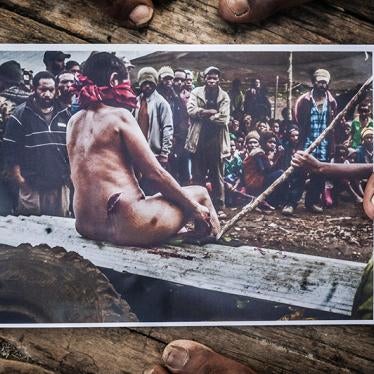(Jakarta)– The failure of Papua New Guinea’s government to address longstanding police brutality led to further abuses against criminal suspects and others in 2013, Human Rights Watch said today in its World Report 2014. Domestic violence and other attacks on women, including on women accused of sorcery, remain rampant.
Police violence in 2013 included beatings, rape, and fatal shootings. In June, police slashed the ankles of 74 men with machetes following a street brawl. While some police officers have been arrested for these crimes, none have been convicted.
“Papua New Guineans face violence at every turn, including from the police, who should be protecting them,” said Brad Adams, Asia director at Human Rights Watch. “The government should call a halt to police abuse and bring any officers responsible for crimes to justice.”
In the 667-page World Report 2014, its 24th edition, Human Rights Watch reviews human rights practices in more than 90 countries. Syria’s widespread killings of civilians elicited horror but few steps by world leaders to stop it, Human Rights Watch said. A reinvigorated doctrine of “responsibility to protect” seems to have prevented some mass atrocities in Africa. Majorities in power in Egypt and other countries have suppressed dissent and minority rights. And Edward Snowden’s revelations about US surveillance programs reverberated around the globe.
The government responded to violence against women in 2013 with legal reforms, including passing a bill criminalizing domestic violence. Following a spate of brutal sorcery-related attacks and murders, the government changed the law so that “black magic” killings will be treated as murder.
The government took a negative turn by expanding the scope of the death penalty to deter violent crime, Human Rights Watch said.
“The government needs to ensure that anyone responsible for violence against women is arrested and prosecuted to turn this appalling trend around,” Adams said. “But expanding the scope of the death penalty and resuming executions would be a serious step backward.”
In July, Papua New Guinea signed an agreement with Australia to accept, process, and resettle asylum seekers transferred from Australian territory. In October, staff from the Office of the United Nations High Commissioner for Refugees visited the country’s detention center on Manus Island and reported on inhumane detention conditions for asylum seekers, unfair refugee determination processes, and mandatory and arbitrary detention.







